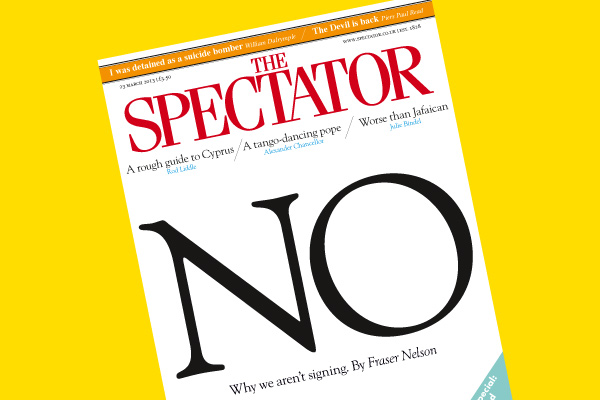Whatever else is said about David Cameron’s hand-ling of press regulation, there can be no doubt that the deal he struck on Monday demonstrated masterful sleight of hand. Just days earlier, his differences with Ed Miliband and Nick Clegg had seemed irreconcilable and the Prime Minister was heading for defeat in the Commons. But then, overnight, everyone united around a compromise: a state regulator which insisted it was no such thing. It was the political equivalent of Magritte’s ‘Ceci n’est pas une pipe’; Britain’s first piece of legislative surrealism.
The Royal Charter’s ornate, 17th-century language is part of the obfuscation. It begins: ‘To all to whom these presents shall come, greeting!’ That is in a way appropriate: the last time England had state licensing of the media, in 1680, people did speak this way. There follows a 22-page, 111-point charter laying out how the press in Britain is to be governed. Not authored by the government, apparently, but by a monarch by dint of her ‘especial grace, certain knowledge and mere motion’.
At first, the newspapers treated news of the charter with stunned silence. What started out as a sensible attempt to regulate the 21st-century press somehow ended up lost in the 17th century. The language was kept deliberately vague to allow every political party to claim victory: if no one knew what it meant, how could anyone object? But one thing was clear: a cabal of politicians had gathered in an office until 2.30a.m. on a Monday morning to stitch up a deal, with the campaign group Hacked Off in the next room. They were acting on a shared premise: that the press would at last be theirs to regulate.
It was Nigel Lawson, a former editor of this magazine, who observed that the most dangerous moments in our democracy come when all parties agree. Consensus means no proper scrutiny, and that glaring flaws go unnoticed. So it is with the Royal Charter. It is deeply illiberal, proposing a new system of ‘exemplary damages’ for non-licensed publications that may yet prove against European law. Worse, it solves none of the problems that have so dogged the British press and appalled the public, and by invoking the most egregious examples of press intrusion, and the disturbing notion of victims’ justice, the political class is attempting an audacious power grab. It’s true that the voicemail hacking, the theft of Kate McCann’s diary, the policemen taking bribes from tabloid journalists were sickening abuses of press power. But they were all violations of existing law, which is why scores of journalists have so far been arrested. Not a single proposal from the Royal Charter would have helped the McCanns — or, indeed, Hugh Grant, Max Mosley, Sienna Miller or the other celebrities who (we now know) funded the Hacked Off campaign. Throughout this jamboree, there has been no real connection made between the problems outlined and the solution proposed.
Ed Miliband rightly pointed out that there has been a ‘pattern of decades and decades where politicians promised to act on wrongdoing by the press, and failed to do so’. In fact, it goes back for centuries: the press would err, and politicians would attempt to seize power over it.
The idea of statutory press regulation was proposed in 1952, and The Spectator was implacably opposed. ‘Everyone who really understands what freedom of the press means and cares about it,’ we argued, ‘must resist such a proposal to the uttermost.’ This was the consensus until very recently. Five years ago even the Labour-dominated culture, media and sport committee agreed, and declared that ‘statutory regulation of the press is a hallmark of authoritarianism and risks undermining democracy’. On Monday, 530 MPs voted for this statutory regulation of the press. Just 13 voted against.
This seismic shift in parliamentary opinion can only partly be explained by the hacking scandal. The debate on Monday exposed just how raw the wounds from the expenses scandal still are. Honourable members were heard recalling the fate of colleagues ‘who were turned over by the press’ as if they too were ‘victims’ of a cruel, intrusive media. H.L. Mencken said journalist is to politician as dog is to lamppost. This week has been about the revenge of the lamppost. Perhaps this is why, from the beginning, David Cameron admitted that he would not be able to control his party on this issue. When he summoned the Fleet Street editors around the table at 10 Downing Street on the publication of the Leveson report, he said he wanted to protect the press but that he needed to assuage his baying backbenchers. Oliver Letwin, who the press have had much fun mocking over the years, was introduced as the grand fixer. Letwin told the editors that they could come up with self-regulation by all means, but it would have to follow Leveson’s recommendations ‘to the centimetre’. It was an instruction, and it was a sign that the tables were turning. Politicians were now in charge.
Soon after, I attended a breakfast held by newspaper editors in a private room of the the Delaunay restaurant in London, where James Harding, the now-departed editor of the Times, whizzed through the Leveson recommendations. To everyone’s amazement, nearly all of us agreed. The press was prepared to implement what Lord Justice Leveson wanted: up-front corrections, a new code of conduct, and fines of up to £1 million. Cameron’s hunch was right: Leveson’s substantive proposals could be introduced without the coercive hand of the state. It seemed, then, as if press freedom could be saved.
But as talks proceeded, it became clear that Mr Cameron was almost alone in his hope that the essential liberty of the media would be preserved. Hacked Off was arguing for state regulation — well, of course it was. Hacked Off was spun out of a group known as the ‘Media Standards Trust’ and its aim has always been to create a world where the press would be governed by ex-lawyers, professors of journalism and other worthies. Their ideas seemed acceptable to Letwin. He was much taken by the fantasy press regulation bill drafted by Hacked Off, and often waved it in the faces of visiting newspapermen. ‘This makes sense to me!’ he’d say, challenging them to come up with something better. It became clear that he did want government regulation — several pages of it.
The concept of a Royal Charter is a typical Letwin fudge. He is a charming man who talks as if he belongs to another century — although it’s never quite clear which one. He is unworldly enough to have let a burgler into his house at 5a.m. — and seems not have spotted the problem with the idea of expanding regulation to encompass the internet. Even Lord Leveson stopped short of this, but the Royal Charter proposes to license (and, if necessary, inflict exemplary damages) on any ‘relevant publishers’. This could include blogs.
The idea that politicians may be able to regulate the internet too was an unexpected bonus for some. In Monday’s debate Tom Watson, a Labour MP who in his spare time has written a book about his pursuit of Rupert Murdoch, was delighted that ‘at this late hour, I hear that the charter extends its remit to internet publishing’. He made suggestions as to how it ought to be categorised, and even hinted at state subsidy for websites that politicians approved of. MPs, he said, have a ‘responsibility to give something back to journalism’ and should find ‘imaginative ways to support investigative journalism’.
It is just as the advocates of press freedom feared: politicians cannot stop themselves. Give them control over print and they’ll come back for digital. Next they will want to distinguish between ‘good’ and ‘bad’ journalists, to reward their friends and punish their enemies. Just a whiff of this sort of power has intoxicated Alex Salmond, who commissioned a review which recommended that Scotland make licensing of the press compulsory. His devolved government would license bloggers, a handy tool in the run-up to the 2014 referendum. He was forced to drop the plans after they caused an uproar, but his intention was clear.
Perhaps the general public think state regulation is a good thing; that hacks should be restrained by people who aren’t themselves in the media. But what may not be appreciated is the insidious influence politicians already try to exert over the press: the quiet words over dinner, the phone calls made to editors, myself included. I have been asked to chastise ‘irresponsible’ reporters and remove articles that politicians find insulting from the website. On minister called to ask if I was aware that a Spectator journalist had been rude about him without first seeking the advice of his spin doctor. It’s as if MPs have lost sight of what a free press is for.
When the public think of a ‘bad journalist’, they imagine a hack who plagiarises, lies, or in some other way breaks the law. When a politician thinks of a bad journalist, more often than not he imagines someone who has criticised him, unfairly in his opinion. So of course there’s political lip-smacking about an era in which politicians have the power to define what is acceptable journalism. Or, as Labour’s Jim Sheridan put it on Tuesday, expel the ‘parasitical elements’ within the press. But this is an attack on freedom.
The attack is coming close to succeeding not because Fleet Street is so strong, but because it is so weak. Newspapers have been haemorrhaging sales and influence for years — and for many editors the pressing issue is not liberty but survival. On current trends, the Independent, Financial Times and Guardian will have all vanished from newsagents by the end of the decade. All three had declared they would be happy to join a system of state licensing, and still want to make the Royal Charter work.
There is another way. Cameron’s Royal Charter is not compulsory: rather it is like a strange new club looking for members. We do not have to join. The press could decide that, after due consideration, we will set up our own genuine self-regulatory system, along the lines agreed at the Delaunay breakfast. This would be perfectly legal. Perhaps the cap on potential damages could be increased to £2 million. We at The Spectator would happily sign up to what would still be the toughest regulation in the western world.
Last year, Cameron warned that politicians cannot be trusted with media regulation. He has, alas, proved himself right.






Comments